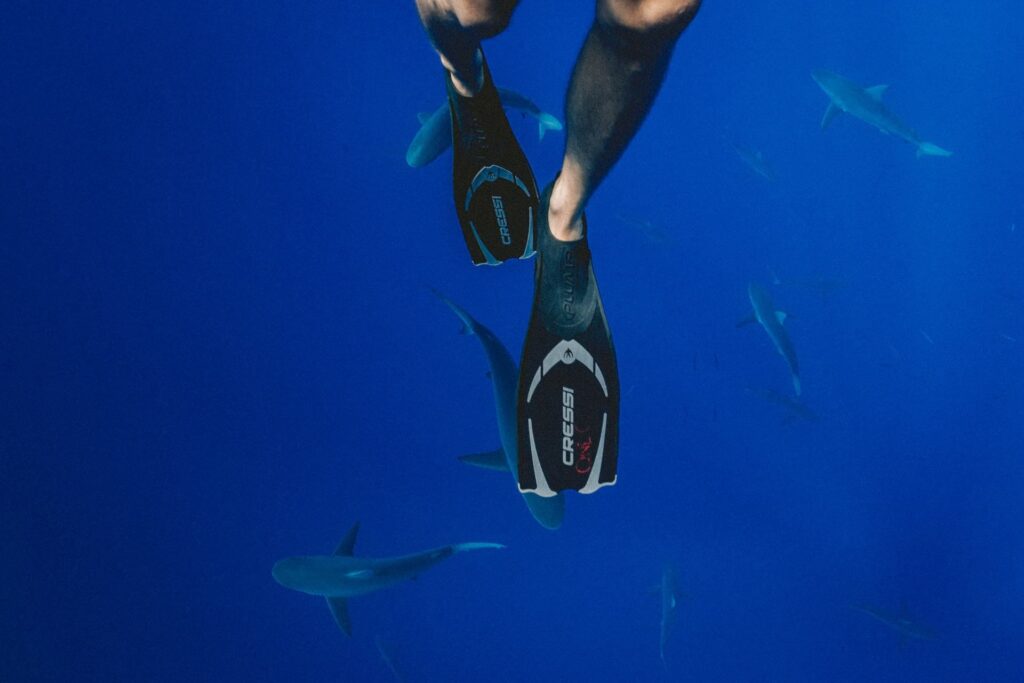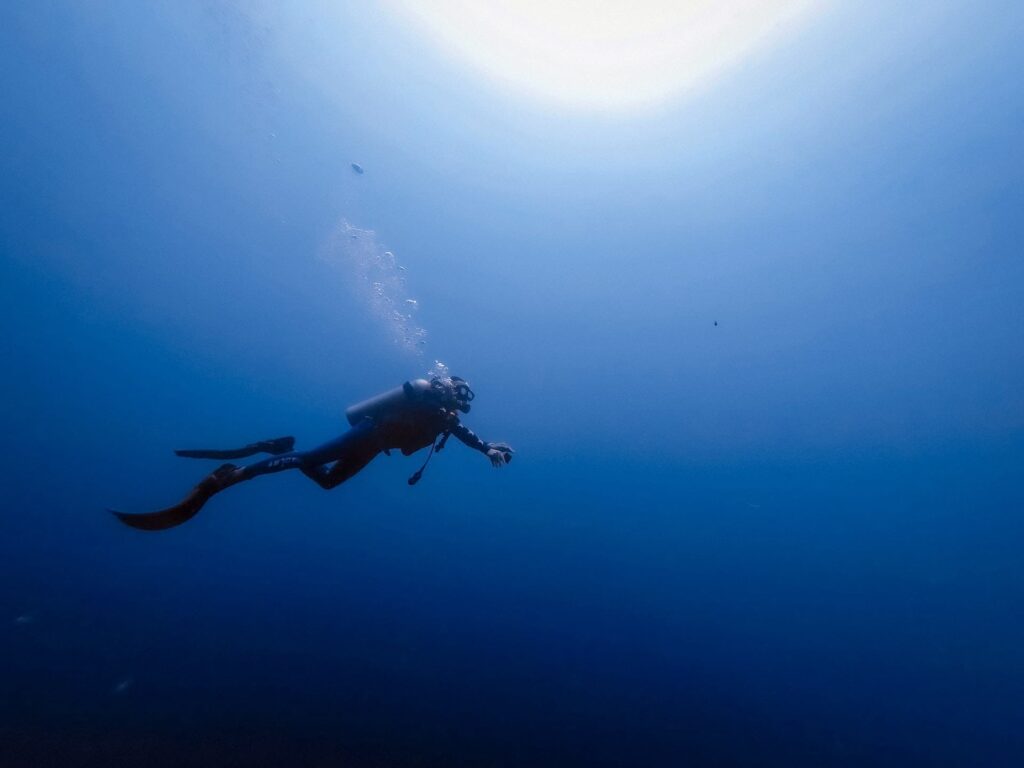Ask any open water diver why they love scuba diving, and they’ll say the unbeatable sensation of weightlessness, getting to experience a whole different world, or simply connecting with their friends and family.
But if you’ve never been scuba diving before, it can seem a little daunting. And getting certified isn’t cheap, so how do you figure out if it’s something you’ll enjoy?
In this guide, we’ll show you how to go scuba diving without certification and why you should give it a try at least once in your lifetime.
Maybe kayaking is more your vibe? If you’re thinking about trying kayaking, check out our guide on what you should wear out on the water.
The Benefits of Scuba Diving
It’s not just a lot of fun; going scuba diving has some surprising benefits, too.
Increased emotional well-being
If you’ve ever sat and watched a tropical fish swim in an aquarium, you know how soothing it is. Now imagine how relaxing it would be to watch hundreds or thousands of fish swimming around in a colorful underwater world.
The more biodiversity, the better the effects on your well-being, studies suggest. It could even reduce feelings of depression and help divers achieve a better mental attitude.
Improved circulation
There is a pressure gradient you get exposed to when underwater, and because your muscles are working against it, you need more oxygen. This means your blood vessels open up, and your circulation improves.
Relieved stress
There are breathing techniques used in scuba diving that are similar to those used in meditation. By bringing your focus to your breathing and everything around you, stress melts away. You really do feel like you’re in a completely different world for a while.
Better concentration
When you go scuba diving, you get better at concentrating. From keeping your balance to paying attention to your partner and your environment, your concentration gets sharper.
We spend so much more time on our phones than we did just a few years ago, so scuba diving acts as a great balance to keep your mind sharp.
Better strength and flexibility
It might not seem like it, but you’ll get quite the workout as a scuba diver! You’ll start using muscles you didn’t even know you had for swimming, balance, and manoeuvering. The best part is it doesn’t feel like a strenuous workout, so it’s a gentle way to build your fitness.
Improved skin
This one is more of a side effect, but seawater has been found to be incredibly beneficial to the skin. It improves elasticity and outward appearance with just minimal exposure (the kind you’ll get being near the water before and after diving).
Not to mention the vitamin D boost you get from being out in the sunshine – just don’t forget your sunscreen!
The Risks of Scuba Diving

Although it has some great benefits, there are also some serious risks that it’s important to know about before you go scuba diving.
Drowning
This is one of the highest-risk occurrences, even though you don’t hear about scuba divers drowning as often. It can be easy to panic out in the water if there’s an emergency. Another risk is becoming unconscious due to an accident or health issue.
The easiest way to prevent drowning when scuba diving is to use the buddy system and get some training before you start.
Decompression Sickness
When you breathe in compressed air at depth, your tissue absorbs extra nitrogen. Once you resurface, the reduction in pressure causes that nitrogen to form nitrogen bubbles inside the tissue.
This is what causes decompression sickness (more commonly known as the bends). It causes intense pain and can result in nerve damage and even death if left untreated.
Arterial Air Embolism
If a bubble forms in an artery on the ascent, it can cause a blockage and stop blood flow (which is the arterial air embolism). This will usually lead to damage to the lungs and can be very serious.
Nitrogen Narcosis
If you start to feel giddy or dizzy at depths of around 100 feet, you probably have nitrogen narcosis. It doesn’t cause permanent damage, but it can lead to a temporary reduction in motor coordination and reasoning. When your decision-making is poor, you’re more likely to suffer from the other risks on this list, which can be incredibly dangerous.
Nitrogen Narcosis is one of the main reasons why you need to have additional training after becoming certified if you want to scuba dive beyond 60 feet.
How to Stay Safe While Scuba Diving

Don’t be put off by the risks. As long as you do your research and know how to stay safe, you minimize your risks greatly.
Here are some quick tips for staying safe while scuba diving, but you’ll always learn more from a certified diver.
Never hold your breath
The number one rule of scuba diving is never to hold your breath. The air in your lungs expands during ascents and contracts during descents. As long as you continuously breathe during both, air can escape your lungs, so there shouldn’t be an issue.
However, if you hold your breath, that air will expand and can cause your lung walls to rupture. So just remember – keep breathing.
Ascend slowly
You’ll likely suffer from the bends if you ascend too quickly, so always come up slowly and safely. Most divers will have a computer that tells them whether they are coming up too quickly. However, a rule of thumb is never to ascend quicker than your smallest air bubbles.
Check your gear
Always check all of your gear before you dive, and do a buddy check of your buddy’s equipment, too. Even one piece of faulty equipment can make a dive extremely dangerous.
Also, make sure you are totally familiar with how all of the equipment works. If you’re not confident, you might panic when you’re at depth.
Scuba dive within your limits
If you were trying out skiing for the first time, you wouldn’t head straight for the black diamond run. You’d try out the nursery slopes until you got your confidence and then work your way up.
Scuba diving is no different. Start with what you’re capable of, both physically and mentally. If you feel unsure, cancel a dive or change the location – it’s always best to be safe.
Plan your dive
Just like going hiking on a new trail, you need to spend some time planning your dive. Before you hit the water, you should know how long you’ll be down for and how deep you plan on going.
You also need to do your research on the area, including currents, tides, possible risks, and emergency procedures.
Can you go Scuba Diving Without Certification?

If you’ve never gone scuba diving before, you might be wondering if you can go diving without scuba certification. The short answer is yes!
However, you should also be under the supervision of an instructor or professional who is experienced. This is the safest way to give scuba diving a go to see if it’s for you.
Although scuba diving isn’t difficult, it does require unique skills, so you’ll need someone who knows what they’re doing to guide you.
You should never hire scuba gear and go out on your own if you don’t know what you’re doing.
How To Go Scuba Diving Without Being Certified
One of the best ways to try scuba diving without being certified is to go to a resort where there are diving instructors. You’ll be taken out on guided fun dives once you’ve been given some quick safety training.
With a resort diving instructor, you’ll start with an on-land scuba lesson to learn about the equipment and safety procedures. They’ll teach you hand signals and how to use all of the scuba gear they supply you with.
Once you get the hang of it, you’ll usually be taken to a pool or confined water, where you can try out the scuba diving equipment without the risk of being in the ocean. Then you’ll head out on a shallow scuba dive where you can explore local reefs.
You won’t be able to go on deep dives without being scuba certified. But if you find a passion for scuba diving under an instructor, you could then look at getting your scuba diving certification so you can go on more challenging dives.
Aquarium Dives
If you don’t have access to the coast or can’t find a dive instructor, check the local aquariums. Most of the world’s major aquariums offer dive experiences that let you get up close and personal with marine life.
Again, you’ll get some basic training and get to try out scuba diving without a diving certification.
Looking for Adventures for Your Bucket List?
Scuba diving is a great experience to have, even just once in your lifetime. Whether that’s exploring the Great Barrier Reef in Australia or getting to swim with sharks in an aquarium, it’s a unique adventure.
Just remember to stay safe, do your safety training, and use the buddy system for every dive.
If you’re looking for the best adventures to add to your list, you can’t beat underground kayaking in Red River Gorge – head to our next guide to find out more about this must-try experience.

